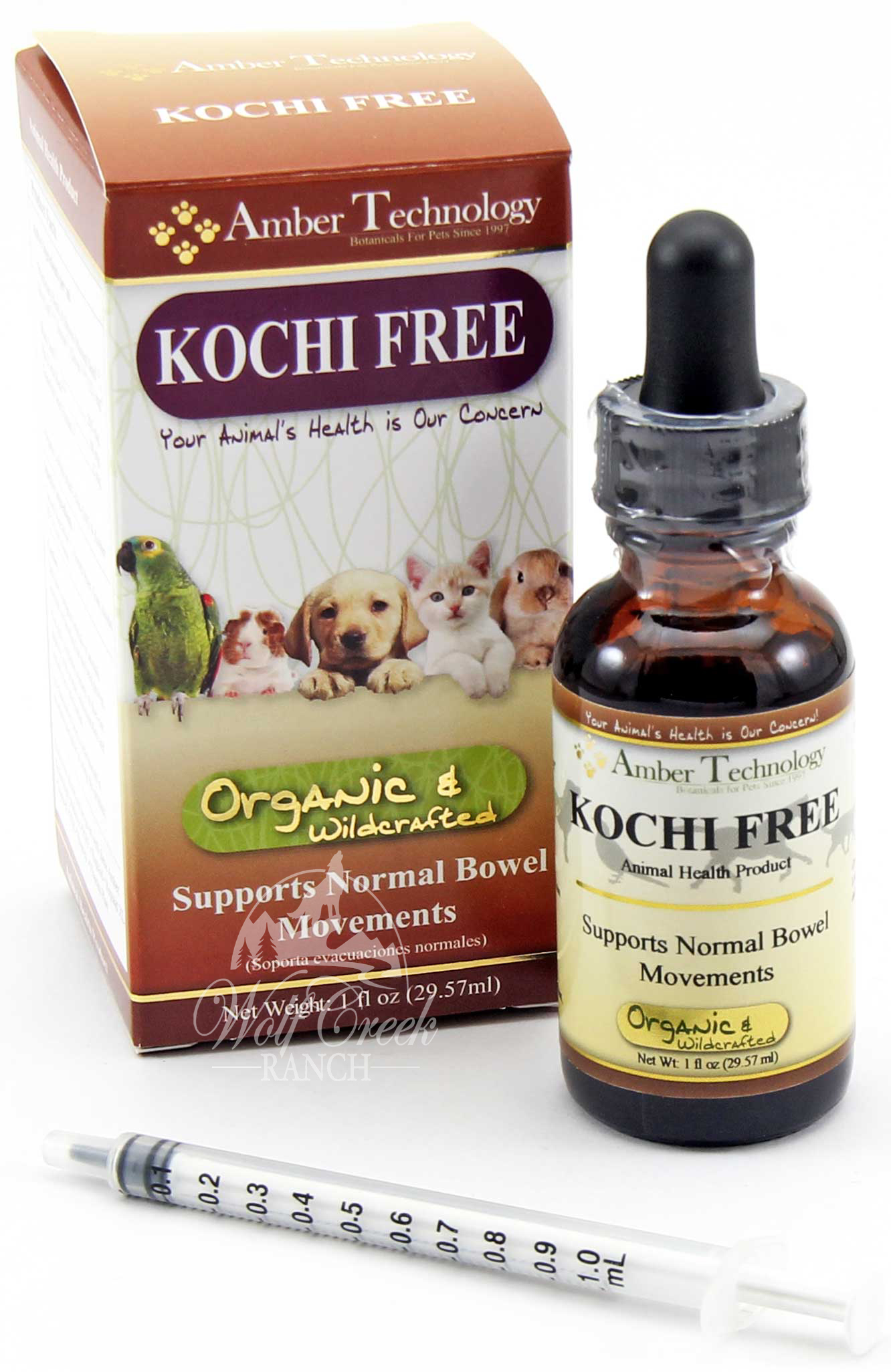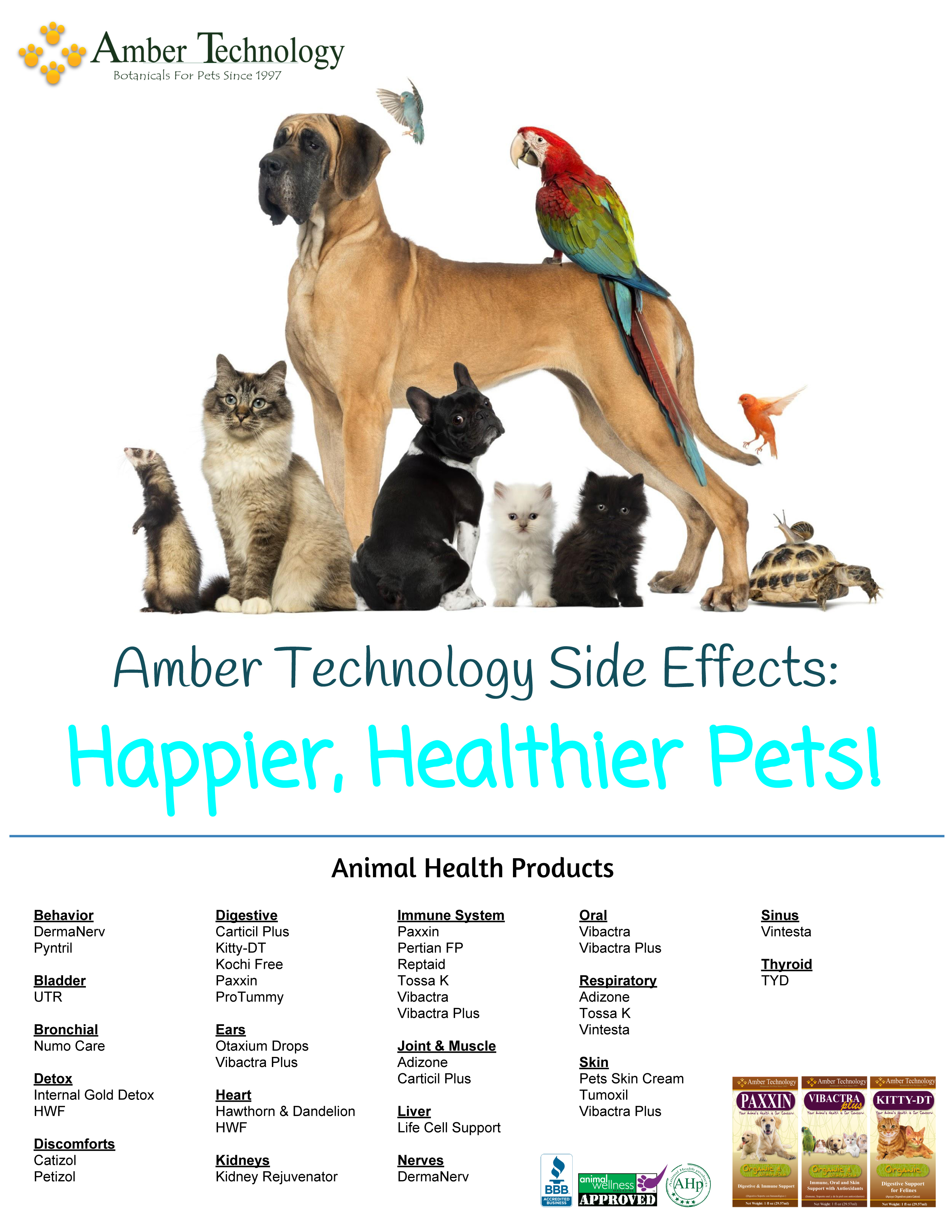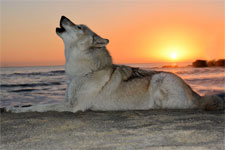
Home of Whispering Winds Wholistic Animal Sanctuary
Phone: (951) 674-0921 / Fax (951) 674-9998
KOCHI FREE
(formerly known as KOCCI FREE)

We have moved. In a few seconds you will be taken to our new website. If it does not redirect in 5 seconds, please click Wolf Creek Ranch Organics here. Please bookmark remember to update your bookmark.
- Product Description
- Ingredients
- Directions for Use
- Cautions/Warnings
- Side Effects
- Buy Kochi Free
- Retailers
- Pamphlets
- More Than One Pet?
- Giardia/Coccidia Info
- Testimonials
Kochi Free (formerly known as Kocci Free) ~ is an all natural organic herbal treatment remedy with antioxidants formulated to help your pet overcome coccidosis (also known as coccidia or cocci) and giardia (aka giardiasis). This natural Kochi Free (aka Kocci Free) remedy can help your dog, cat, bird, goat, sheep, guinea pig, horse, ferret, rabbit, raccoon, and other animals eliminate coccidia and giardia infection.
KOCHI FREE (aka KOCCI FREE) can help:
- Stimulate immunity
- Rid the body of microscopic parasites such as Coccidia and Giardia
- Kill viruses, bacteria, and fungi
- Soothe the digestive system
- Rid the body of free radicals
- Prevent coccidia or giardia if dosed preventatively
What is the traditional veterinary treatment for coccidia or giardia?
Traditional coccidia or giardia veterinary treatment consists of giving Albon (aka Sulfadimethoxine), Flagyl (aka Metronidazole), or Marquis (Ponazuril) for 10 to 14 days. In some cases, numerous 10 to 14 day treatment cycles are needed. Since neither Albon, Flagyl, or Marquis treatment actually kill coccidia or giardia protozoan, they are not always effective. Kocci Free will eliminate these protozoan, even after numerous rounds of Albon and/or Flagyl have been unsuccessful.
Kochi Free (aka Kocci Free) is known to eliminate coccidia and giardia infections even when numerous rounds of traditional coccidia or giardia treatment has failed! Kochi Free honestly and truly works ALWAYS when used for treatment of coccidia or giardia protozoan.
What are the natural organic Kochi Free remedy ingredients?
Active Ingredients per ml of Kochi Free (clicking on an ingredient will take you to our Ingredient information page)
| Black Seed 2, 3 | 205 mg |
| Pau D'arco Bark 2,3,4 | 68 mg |
| Grapefruit Seed Extract 1,3 | 2 mg |
Inactive Ingredients
Concord Grape Wine 2,3, Filtered Water, Grain Alcohol 1,3 USP 21% by volume
1~Organic 2~Wildcrafted 3~Non-GMO 4~Kosher
Kochi Free has a 4 year shelf life.
| Animal Weight | Drops | ml/cc | # of Servings per 1oz. Bottle |
| under 3 lbs. | 2 | 0.06 ml/cc | 493 |
| 3 to 10 lbs. | 5 | 0.15 ml/cc | 197 |
| 11 to 25 lbs. | 10 | 0.30 ml/cc | 99 |
| 26 to 80 lbs. | 13 | 0.40 ml/cc | 74 |
| 81 to 150 lbs. | 15 | 0.45 ml/cc | 66 |
| 151 to 250 lbs. | 20 | 0.60 ml/cc | 49 |
**Suggested Use for larger animals such as horses, elephants, giraffes, etc.: For pets over 251 lbs, add 5 drops for every additional 100 lbs of body weight.
Directions for Use: Shake Well.
FOR CANINES & FELINES:
General: Give 4 times daily as needed for up to 30 days.
animals: Give half the dose 1-2 times daily. (see caution)
FOR BIRDS, RABBITS & GUINEA PIGS:
Add 20 drops to every 8 oz of water.
Suggested Preventative Use: Kochi Free (aka Kocci Free) can be given twice a day for 10 days. Begin using a few days before and after a show or boarding at a kennel or when your pet has been exposed to another animal with a viral, bacterial, fungal, or microparasite infection. For prevention of coccidia and giardia in puppies and kittens, begin 10 day dosing schedule after weaning. This can help prevent your animal from coming down with the infection. Although this is not a guarantee, using Kochi Free as a preventative works well to help prevent disease, if dosed preventatively as soon as you know your pet has been exposed to infection.
Suggested Immune System Enhancement Use: Give 2 times daily.
Suggested Use for SEVERE Coccidia or Giardia Infections: In MOST cases, it will take only a 10 day treatment to rid your pet of Coccidia or Giardia. Infact, we have NEVER had a customer have to treat their animal(s) for coccidia with Kochi Free (aka Kocci Free) more than one full 10 day treatment. However, if you have a crowded situation (i.e., kennel, farm, unclean property, etc.) you may have to do a 10 day on and 10 day off cycle program. This program consists of Kochi Free and Paxxin (formerly Parvaid) (for dogs, horses, and other animals except cats) or Kochi Free and Kitty-DT (formerly Kitty Distempaid) (for kitties, bobcats, lynx, and other feline species). Give both products for 10 days, then go off for 10 days (be sure to cleanse the premises well during treatment). Go back on for another 10 days. You will do this until you have completed 3 ten day cycles. Refer to chart below:
| 10 Day Cycle | Kochi Free | Paxin (aka Parvaid) or Kitty-DT aka Kitty Distempaid) |
| 1st 10 days | Give 4x/day | Give if needed |
| 2nd 10 days | Do not give | Do not give |
| 3rd 10 days | Give 4x/day | Give if needed |
| 4th 10 days | Do not give | Do not give |
| 5th 10 days | Give 4x/day | Give if needed |
Where dogs are vomiting and having diarrhea some dogs would be more comfortable if given Paxxin (formerly Parvaid) in addition to the Kochi Free formula. Paxxin (aka Parvaid) helps calm the stomach, soothe the intestinal tract, boost the immune system, and helps stop vomiting and diarrhea.
Where kittens are vomiting and having diarrhea some kittens would be more comfortable if given Kitty-DT (aka Kitty Distempaid) in addition to the Kochi Free formula. Kitty-DT (aka Kitty Distempaid) helps calm the stomach, soothe the intestinal tract, boost the immune system, and helps stop vomiting and diarrhea.
Caution: Do NOT exceed recommended dose! Safe use in pregnant animals or animals intended for breeding has not been proven. If animal's condition worsens or does not improve, stop product administration and consult your veterinarian. An examination from a veterinarian is recommended prior to using this product.
Warning: For animal use only. Keep out of reach of children and animals. In case of accidental overdose, contact a health professional immediately.


KOCHI FREE (aka KOCCI FREE) ONLINE HERE
KOCHI FREE (aka KOCCI FREE) ~ Natural organic Kochi Free remedy is effective in the prevention and treatment of coccidia and giardia protozoan.
To order please visit our new site: Wolf Creek Ranch Organics.
Click here for Kochi Free (formerly Kocci Free product pamphlet
Click here for Amber Technology Herbal Tincture Information Pamphlet
SUGGESTIONS WHEN TREATING MORE THAN ONE PET:
AMBER GLASS BOTTLES ~ If you have numerous puppies experiencing coccidia or giardia, along with puppies you want to take preventative measures, you might want to consider purchasing one or more amber glass 1/2 oz., 1 oz., or 4 oz. dropper bottles, so you can split up some Kochi Free and/or Paxxin/Kitty DT into a smaller bottle. That way you can use one bottle for preventative purposes and the other for active gastrointestinal issues.
In addition, when treating more than one pet, it is necessary to assure sterile administration without carry over from pet to pet. This is very important while treating puppies with gastrointestinal issues, especially when using Paxxin to treat some pups and using as a preventative for others. The best way to assure this is to use the dropper only to transfer product to an individual sterile oral syringe, using a different syringe for each pet. (This method will also reduce the chances of product contamination.) Those syringes should be sterilized after each use. Each pet should have its own syringe that is not shared with another pet.
The use of a syringe containing measured drops from the dropper will also remove the risk of the animal biting the glass dropper.
SYRINGES ~ these are luer slip syringes without needles that are excellent for administering measured amounts of Paxxin, CS, tinctures, etc. Reinforced tip, large finger grips, smooth draw and easy-to-read graduations. Rubber plunger with double contact for a positive seal and effortless injection. FDA approved and autoclavable.
Puppies/kittens weighing under 3 pounds need 5 to 6 ml syringes. Animals weighing 3-10 pounds need 12 ml syringes. Puppies weighing 11-20 pounds need 20 ml syringes. Puppies weighing 21-40 pounds need 50 ml syringes. Puppies 41-50 pounds need 60 ml syringes.
SYRINGE ~ 5 ml ~ $.85
![]()
SYRINGE ~ 6 ml ~ $1.00
![]()
SYRINGE ~ 12 ml ~ $1.75
![]()
SYRINGE ~ 20 ml ~ $2.50
![]()
SYRINGE ~ 60 ml ~ $3.25
![]()
AMBER GLASS BOTTLES ~ These are terrific for storing dried herbs, tinctures, colloidal silver, etc. All are boston rounds and have black plastic phenolic lids, unless noted. The misters are fabulous and deliver a very light and delicate mist. Excellent for misting the face or for animals who are shy of sprayers. The cute little 1/2 oz. droppers are perfect for splitting 1 oz. tincture bottles into two separate bottles.
To see photos of the Amber Glass bottles click here.
AMBER ~ 1/2 oz. w/Dropper ~ $2.50
![]()
AMBER ~ 1 oz. w/Dropper ~ $3.50
![]()
AMBER ~ 4 oz. w/Dropper ~ $4.75
![]()
| What is Coccidia | What is Giardia | Symptoms |
What is Coccidiosis?
Coccidia are small protozoans that multiply in the intestinal tracts of dogs, cats, goats, and other animals though most commonly in kittens, puppies, kids, and young animals less than 6 months of age, but coccidia can also affect adult animals whose immune system is suppressed or in animals who are stressed in other ways (i.e., change in ownership, other disease present, etc.). Cat and dog coccidia are most often of the genus called Isospora. Isospora canis and I. ohioensis are the species most often encountered in dogs; I. felis and I. rivolta are the most common in cats. Regardless of which species is present we generally refer to the disease as coccidiosis. As a puppy or kitten ages it tends to develop a natural immunity to the effects of coccidia. As an adult it may carry coccidia in its intestines, shed the cysts in the feces, but experience no ill effects.
What is Giardiasis?
Giardiasis, aka Giardia, are small protozoans that can affect nearly all warm blooded beings, humans and animals. Animals or people can be affected by consuming water or food that is contaminated with giardia cysts. When giardia reach the gastrointestinal tract they swiftly multiply and block the intestinal absorption causing loose, mucousy stools, diarrhea, listlessness, weight loss, dehydration, and can cause scarring in the small intestine, pancreatic insufficiency, and malabsorption syndromes.
People can get giardia infections from their pets. Fecal testing is not as accurate as it should be. People and animals can test negative even when they have giardia infection, so it may take numerous fecal smears to confirm infection.
People and pets that are infected with giardia can get it again, so it is essential to disinfect well. Finding the source of giardia is helpful, as eliminating giardia from your home and property can be difficult as the cysts are very hardy. They can survive standard chlorination protocols for drinking water. They survive freezing down to –13C and in drying fecal material for long periods of time.
How are coccidia transmitted?
A puppy or kitten is born with the coccidia organisms in its intestine. However, once born, the puppy or kitten is frequently exposed to its mother's feces and if the mother is shedding the infective cysts in her feces then the young animals will likely ingest them and coccidia will develop in their intestines. Since young puppies and kittens, usually those less than six months of age, have no immunity to coccidia, the organisms reproduce in large numbers and parasitize the young animal's intestines. Oftentimes, this has severe effects.
From exposure to the coccidia in feces to the onset of the illness is about 13 days. Most puppies, kittens, and other animals who are ill from coccidia are, therefore, two weeks of age and older. Although most infections are the result of spread from the mother, this is not always the case. Any infected animal is contagious to other animals. In breeding facilities, shelters, animal hospitals, etc. it is wise to isolate those infected from those who are not.
How did my pet or animal get coccidiosis?
Stress plays a role in the development of coccidiosis. It is not uncommon for a seemingly healthy puppy, kitten, foal, or other animal to arrive at its new home and develop diarrhea several days later leading to a diagnosis of coccidia. If the puppy or kitten has been at the new home for less than thirteen days then it had coccidia before it arrived. Remember the incubation period (from exposure to illness) is about thirteen days. If the puppy or kitten has been with its new owner several weeks, then the exposure to coccidia most likely occurred after the animal arrived at the new home. Often, coccidia was present only to surface during the stressful period of the puppy or kitten adjusting to a new home.
What are the symptoms of coccidiosis?
The primary sign of a pet suffering with coccidiosis is diarrhea. The diarrhea may be mild to severe depending on the level of infection. Blood and mucous may be present, especially in advanced cases. Severely affected animals may also vomit, lose their appetite, become dehydrated, lethargic, and in some instances, die from the disease.
Most infected kittens and puppies are in the four to twelve week age group. The possibility of coccidiosis should always be considered when a loose stool or diarrhea is encountered from this age group. A microscopic fecal exam by a veterinarian will detect the cysts confirming a diagnosis.
What are the risks?
Although many cases are mild it is not uncommon to see severe, bloody diarrhea result in dehydration and even death. This is most common in animals who are ill or infected with other parasites, bacteria, or viruses. Coccidiosis is very contagious, especially among young kittens and puppies. Entire kennels and catteries may become contaminated with puppies and kittens of many age groups simulatneously affected.
How is coccidiosis prevented or controlled?
Because coccidia is spread by the feces of carrier animals, it is very important to practice strict sanitation. All fecal material should be removed. Housing needs to be such that food and water cannot become contaminated with feces. Clean water should be provided at all times. Most disinfectants do not work well against coccidia; incineration of the feces, and steam cleaning, immersion in boiling water or a 10% ammonia solution are the
best methods to kill coccidia. Coccidia can withstand freezing.
Cockroaches and flies can mechanically carry coccidia from one place to another. Mice and other animals can ingest the coccidia and when killed and eaten by a cat, for instance, can infect the cat. Therefore, insect and rodent control are very important in preventing coccidiosis.
The coccidia species of dogs and cats do not infect humans.
NOTE: You do not have to be a member of PayPal to use this FREE service.
*These statements have not been evaluated by Food and Drug Administration. This product is not intended to diagnose, treat, cure or prevent any disease. The information on this Web site or in emails is designed for educational purposes only. The information on this web site is not intended as a substitute for the advice of a physician or veterinarian. This information is not intended as a substitute for the reader's independent judgment and personal responsibility. Health issues are far too important to delegate to anyone else. It is highly recommended you research and seek information and counsel from as wide a variety of sources as possible, so you can make well informed educated decisions about you, your child's, or your pet's health, as in the end YOU make the decisions.
CLICK HERE TO SEE ALL WHOLISTIC PRODUCTS
Please use our drop down menus below OR scroll down for a listing of natural products and natural health information.

| Clik Stik | Pet Essentials | Pet Medicine Bags |
| Walk In Sync™ Harness & Get A Grip™ Leash |
PRODUCT, SERVICE & INFORMATION DISCLAIMER
The information on this web site is not intended as a substitute for the advice of a physician or vet. This information is not intended as a substitute for the reader's independent judgment and personal responsibility. Health issues are far too important to delegate to anyone else. It is highly recommended you research and seek information and counsel from as wide a variety of sources as possible, so you can make well informed educated decisions about you, your child's, or your pet's health, as in the end YOU make the decisions.
The information on this Web site is designed for educational purposes only. It is not intended to be a substitute for informed medical advice or care. You should not use this information to diagnose or treat any health problems or illnesses without consulting your vet, pediatrician or family doctor. Please consult a physician or veterinarian with any questions or concerns you might have regarding your, your child's, or your pet's health condition.
The Dietary Supplement Health & Education Act (DSHEA) of 1994 requires us to state: "These statements have not been evaluated by the Food and Drug Administration. These products are not intended to diagnose, treat, cure, or prevent any disease."
Food Grade Diatomaceous Earth is not EPA registered to be used as a pesticide. We cannot ship Food Grade DE to Texas. Any shipments made to California are made with the understanding that it will not be used as a pesticide.
Amber Technology's Herbal Nutraceuticals for Pets Products are not registered with the state of Texas; therefore, we cannot ship these products to Texas.
CLICK HERE TO SEE OUR FULL DISCLAIMER
Visit our new mobile friendly site Wolf Creek Ranch Organics
All Information
and Photos © Copyright 2001 to Present, and may not be used without express written permission from Wolf Creek Ranch.
All Rights Reserved


